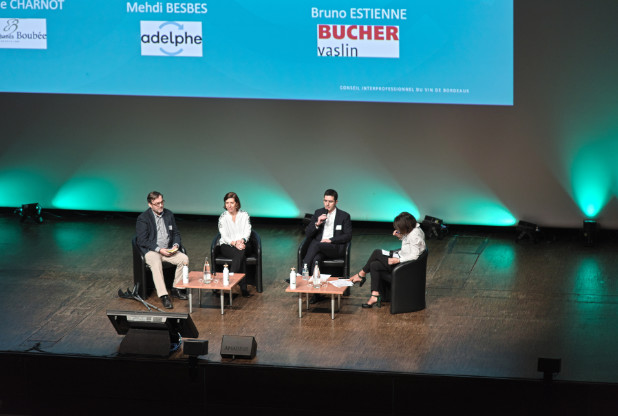
Bordeaux Wines Forum: "There are no more climate-sceptics"
Last week, Bordeaux’s Palais des Congrès hosted the 2023 edition of the Sustainable Development of Bordeaux Wines Forum.
Organised by the Comité Interprofessionnel des Vins de Bordeaux (CIVB), the event had been designed as an opportunity for growers and wine industry stakeholders to familiarise with the effects of the changing climate on Bordeaux’s vineyards and wines, and to promote common practices aimed at tackling related challenges.
The forum, now in its 13th iteration, welcomed a crowd of about 400 people consisting of winegrowers, merchants, scientists, as well as a number of local and neighbouring promotional bodies. Speakers ranged from CIVB’s president Allan Sichel to renowned professor Marc-André Sélosse of Paris’ Natural History Museum, and from producers to Bordeaux wine industry stakeholders.
The event presented an overview of climate-related challenges currently faced by the region’s winegrowing industry. The CIVB pointed out that average temperatures increased by 1.5°C since 1985, causing Bordeaux’s climate to shift from “temperate” to “warm temperate” – as defined by the Huglin classification. Veraison now takes place on average three days earlier than in 1989, a figure that is projected to rise to five, or even seven days within the next decade. Furthermore, the average number of very hot days during the year – with temperatures exceeding 35°C – has increased to 3.5 days, set against 0.8 such days in the decades during 1987-2017; vineyards experience increased water stress, incidence of hail showers, earlier budding, and late spring frosts.
“There are no more climate-sceptics in Bordeaux,” said Sichel. “We might feel powerless, but we are also experiencing an awakening of consciences, which allows us to hope for a lenient future for our generations to come.”
Speaking at the forum, France's National Institute of Agricultural Research (INRAE) research director Sylvain Pellerin explained that the wider agricultural sector is largely to blame for today’s rapidly changing climate. He argued that, with its large production of carbon dioxide (CO2), methane (CH4), and nitrous oxide (N2O), the industry is responsible for about 15% of all greenhouse gas emissions and revealed worrying predictions for the vine growing industry. “If we continue with business as usual,” he said, the region could face a dramatic temperature rise of up to 4.5°C by the end of the century.
However, he also highlighted that “the leeway to stay within the Paris agreement [limit the global temperature increase in this century to 2°C] is narrow but not out of reach yet,” and suggested to winegrowers a number of mitigation strategies such as mastering the nitrogen cycle to limit the production of N2O; and increasing carbon storage through grasslands, hedgerow plantations, and agroforestry.
“We know what to do and have all the tools,” commented Sichel. “We will get there on condition that we all commit to it… The reduction of greenhouse gases and the sequestration of carbon are two major commitments of our [CIVB] sustainability policy”.
During the event, the CIVB offered the audience an update on its recently launched corporate and social responsibility programme (CSR), developed in a bid to help the region undertake a more efficient, holistic collective approach to tackle the changing climate and other sustainability issues. The programme sets out guidelines for economic, environmental and social sustainability, based on ISO 26000 international standards.
CIVB’s CSR programme kicked off in 2019 with a pilot group of 28 Bordeaux merchants, wine growers, and cooperative cellars across 10 AOCs. It then launched officially in 2021 by awarding compliant companies with the Bordeaux Cultivons Demain label.
Today 56 companies benefit from the label and the CIVB aims to have 30% of volumes sold as Bordeaux Cultivons Demain certified wine by the end of this decade.
“Pressure [on developing a more sustainable industry] is increasing from all sides, but we are facing it with confidence, convinced of our will and of the tools we have put in place to find and apply appropriate solutions,” commented Sichel. “Of course, nothing is won and there is still a lot to do to reach the objectives we have set ourselves. For this, each company, whatever its size, must act. The CIVB will accompany companies in this direction by providing information, proposing collective tools, partnerships or by being your spokesperson with key suppliers. We will organise focus groups because collective intelligence always brings more than individualism.”
Keywords:
- CIVB
- Allan Sichel
- INRAE
- Bordeaux’s Palais des Congrès
- Sustainable Development of Bordeaux Wines Forum
- Marc-André Sélosse




